A Grave for Two Read online
‘Step aside, Stieg Larsson, Holt is the queen of Scandinavian crime thrillers’ Red
‘Holt writes with the command we have come to expect from the top Scandinavian writers’ The Times
‘If you haven’t heard of Anne Holt, you soon will’ Daily Mail
‘It’s easy to see why Anne Holt, the former Minister of Justice in Norway and currently its bestselling female crime writer, is rapturously received in the rest of Europe’ Guardian
‘Holt deftly marshals her perplexing narrative … clichés are resolutely seen off by the sheer energy and vitality of her writing’ Independent
‘Her peculiar blend of off-beat police procedural and social commentary makes her stories particularly Norwegian, yet also entertaining and enlightening … reads a bit like a mash-up of Stieg Larsson, Jeffery Deaver and Agatha Christie’ Daily Mirror
Also by Anne Holt
THE HANNE WILHELMSEN SERIES:
Blind Goddess
Blessed Are Those Who Thirst
Death of the Demon
The Lion’s Mouth
Dead Joker
No Echo
Beyond the Truth
1222
Offline
In Dust and Ashes
THE VIK/STUBO SERIES:
Punishment
The Final Murder
Death in Oslo
Fear Not
What Dark Clouds Hide
First published in Great Britain in 2019 by Corvus, an imprint of Atlantic Books Ltd.
Copyright © Anne Holt, 2018
English translation copyright © Anne Bruce, 2018
Originally published in Norwegian as En Grav For To. Published by agreement with the Salomonsson Agency.
The moral right of Anne Holt to be identified as the author of this work has been asserted by her in accordance with the Copyright, Designs and Patents Act of 1988.
All rights reserved. No part of this publication may be reproduced, stored in a retrieval system, or transmitted in any form or by any means, electronic, mechanical, photocopying, recording, or otherwise, without the prior permission of both the copyright owner and the above publisher of this book.
This novel is entirely a work of fiction. The names, characters and incidents portrayed in it are the work of the author’s imagination. Any resemblance to actual persons, living or dead, events or localities, is entirely coincidental.
10 9 8 7 6 5 4 3 2 1
A CIP catalogue record for this book is available from the British Library.
Hardback ISBN: 978 1 78649 869 4
Trade paperback ISBN: 978 1 78649 850 2
E-book ISBN: 978 1 78649 852 6
Printed in Great Britain.
Corvus
An imprint of Atlantic Books Ltd
Ormond House
26–27 Boswell Street
London
WC1N 3JZ
www.corvus-books.co.uk
A GRAVE FOR TWO
THURSDAY 7 DECEMBER 2017
SELMA FALCK
If Oslo were a body, then this would be the city’s backside.
This particular apartment.
This arsehole of a living room.
The tiny room was icy-cold. The grey-brown textured wallpaper had peeled off at the corners, and the cheap laminate flooring was spattered with stains. Especially beneath the windows. Selma Falck hunkered down and gingerly dabbed at one of the dark half-moons. The crust loosened with a sticky, disgusting sound.
The tram had rattled past every fourth minute since she had started to carry in the boxes. The windowpanes were covered with frosted vinyl film, possibly to deter prying eyes. It could just as easily have been to prevent them from falling out, since distinct cracks were silhouetted behind the plastic. The room grew noticeably darker each time trams or heavy trucks passed by outside. It was growing late. Despite someone having used parcel tape to seal the cracks around the windows in addition to the plastic film, an increasingly irritating miasma of exhaust fumes assailed her nose.
The boxes were stacked in two towers by the bedroom wall. Darius squatted on top of one of these, glowering at her, crouching as if ready to pounce, his tail swinging slowly from side to side.
Selma Falck sat down on the only item of furniture in the living room, a red settee from the sixties. It had already been here, and smelled vaguely of heating oil and cheese puffs. At least she hoped it was cheese puffs. Darius suddenly arched his back and hissed angrily, but remained on top of the rickety pile on the other side of the room.
Three weeks and three days had gone by. Since then, Selma had continually caught herself glancing at the time for no good reason, as if she could make it stop with a mere look. Or preferably turn it back. This coming Monday, exactly four weeks since Jan Morell, with unaccustomed gravity, had entered her office, the deadline he had given her would expire.
There were only four days left.
She would soon be on target to lose almost everything she had ever owned.
Apart from her car, which she would never give up, and the cat that Jesso had browbeaten her into taking with her. Darius leapt down from the tower of boxes and slipped soundlessly into the bedroom. Something toppled over in there. Something had broken.
Selma closed her eyes as an ambulance speeded past. The siren tore through the wall. She clutched her ears but it did not help in the least. When she opened her senses again, Darius was standing in the middle of the living room.
His eyes glittered. His tail was still swishing belligerently from side to side. In his mouth, the animal carried a mouse with enough life left in it that its naked tail was twitching convulsively. The cat yawned, and the poor creature dropped to the floor where it lay convulsed with spasms.
Selma Falck had not wept since Saturday 13 December 1986. In six days, that would be precisely thirty-one years ago, and so she was extremely taken aback when she thought she could feel the suspicion of tears on her left cheek. It ought to be a physical impossibility. The surprise made her rise to her feet to find a mirror.
She had listed the medal from that period on eBay a fortnight ago. Not a single soul had shown a scrap of interest. The Olympic medal from two years later would probably have been a surer bet, but she had hesitated to part with it for the time being.
She was not crying, according to the mirror she found in her handbag.
It was impossible for her to live here.
She had to live here. In this rat’s nest. Or mouse’s nest, as already demonstrated, and when she peered up at the ceiling for the first time, she spotted such an enormous greyish-blue stain that she gagged.
And threw up.
The vomit matched the living room carpet.
Within the time limit Jan Morell had given her, she had managed to sell valuables to the tune of just over 13,000,000 kroner. Of that, she was now left with 23,876 kroner and 32 øre, without the slightest notion of when she would be able to earn any money again.
Fortunately no one had any idea where she was. Not Jesso, who apparently couldn’t care less anyway. Not the children, who had both made it clear that they never wanted to see her again, ever, when she had picked up some bits and pieces and filled the boxes from Clas Ohlson before driving off in a delivery van she had borrowed from the Poker Turk. None of her friends knew where she lived, although rumours of illness had apparently spread, leading to fifty-two text messages and unanswered calls in only the last couple of days. Selma Falck did not have cancer. Not as far as she knew. Inadvertently, or actually mostly in desperation, she had been forced to overplay her hand a little when incredulous partners were unable to fathom why she had so suddenly been forced to sell out. She had not used the c-word, but from what she had told them with eyes full of sorrow and a trembling lip, it was not so st
range that the others had drawn the wrong conclusion. The thought made her gorge rise again. She shook her head vigorously, swallowed and decided to forget the mirror and instead find something to get rid of both the dying mouse and the green muck on the carpet.
No one must know where she was.
When the doorbell rang as she reached halfway across the living room floor, she gave such a forceful start all of a sudden that Darius arched his back again. The half-dead mouse crawled helplessly towards the door, as if it thought rescue was at hand out there. Selma padded quietly in the same direction, though she had not entirely made up her mind to open the door.
Someone was knocking loudly and impatiently.
No one knew she was here.
The doorbell rang yet again.
THE CELL
The days were no longer his own.
The room had no windows. An LED light on the ceiling was turned on twenty-four hours a day. No visible cables. Nothing he could rip out. The bed was made of cement and formed part of one wall. He didn’t even have a mattress, just some straw that had already become thoroughly matted and had started to smell.
He hadn’t been given a blanket either. Not even clothes. He wasn’t cold, it was warm in here, but he still hadn’t grown accustomed to sleeping without anything either over or under him. Dozed a little now and then.
Never slept.
Still too terrified.
He obtained water from a hole in the wall. No larger than that he could use his thumb to close it off, he guessed it to be a half-inch pipe. It dribbled continuously. Since he had no cup, he had to slurp it from the wall, where the perpetual trickle of moisture had left a yellowish-brown trail. It was starting to get slimy. Right beneath the spring, on the floor, a grate was fastened over a drain. He pissed there. Had a shit too, at the times when it was possible for him to squeeze something out. The bars on the grate were wider in the middle. Sometimes he was lucky and hit the target. Other times he had to poke at his own excrement with his foot to get rid of it. Push it, and sometimes even force it down.
Occasionally he received food, through a hatch in the metal door. Bread mostly. Bread rolls, sometimes with a spread of some kind. Never anything hot, never something that had to be served on a plate or eaten with a fork or spoon.
The days had gone by. Nights no longer existed.
The light bothered him and had stolen time. He could have been there for a week, a fortnight, or a year.
Not a year.
But a long time. A few days, at least; he should have tried to keep count of time from when he woke with no idea of where he was. He did not know why he was there. Had absolutely no clue. He screamed at the unknown figure that brought his food. Yelled and battered his fists until they bled on the grey steel of the closed door. Out there it was always silent, and the hatch was too small to discern anything except shadows on the other side.
The man must know him. It had to be a man. When he woke and found himself a prisoner, he felt pain beneath the tendons of his knee and at the top of his back, as if someone had carried him. Dragged him for a stretch too; his heels were sore. It must be a man, and he must know him.
There was nothing in here he could use to kill himself.
He wanted that more than anything; he would prefer death to this and had tried to ram his head into the wall with all the strength he could muster. Several times. All he had achieved were cuts and bruises. He had stuffed his mouth full of straw, but kept coughing it all back up again. A reflex, he assumed. He had wet the fucking grass, made it soaking wet and crammed it into his nose and throat, as hard as he could; he had almost succeeded, but just as the room went pink, his head became light and he sank down on to the bed, he had been overtaken by fits of coughing and had spewed it all up again.
Every time.
Whoever was holding him captive must know him.
Whoever had imprisoned him must know that he would choose death rather than this. And the worst thing, the very worst thing, was that each time the stranger had delivered some food, only now and then and in a pattern that was impossible to work out, that scraping, mechanical noise came from behind one wall.
It then moved closer and made the room steadily smaller.
THE SKIER
In the long series of more or less meaningless events that comprise a life, this day would be included as forgettable, no big deal, Hege Chin Morell thought. In time, she would look back on these days, these weeks that lay ahead of her and this surreal moment, and shrug with indifference.
Just a bump in the road. An annoying but surmountable obstacle on the road towards a brilliant Olympic Games in PyeongChang.
She was twenty-four years old and had decided that everything going on at present had actually not happened. It was too absurd. So obviously untrue. Something had gone wrong, and that something would be identified. The negligence would be corrected. It was simply a question of time; she’d tried to convince herself in the three days plus that had passed since she had received the incredible information.
Every minute of this hell on earth was sixty seconds too many.
The people facing her had become a greyish-blue, noisy mass. She closed her eyes gently and concentrated on picturing herself in her mind’s eye, triumphantly crossing a finishing line. A Christmas tree; a swallow dive into salt water. Her mother’s face, less distinct as the years passed, the smile that Hege could no longer completely catch except in fleeting retrospective glimpses. Mum’s blue eyes and her long, pale blonde curls, so different from Hege’s black, coarse hair that mother and daughter had woven a zebra plait of both their locks when she was little and was allowed to fall asleep in the crook of her mother’s arm once the nights grew too dark.
The most important thing of all, of course, was something she did not remember. Someone, probably her birth mother, had left her outside the absolutely correct children’s home. There was a photo of Hege, barely two months old, in a basket, with scabs in what little hair she had. She was wrapped in clean rags and had a green bear made of hard plastic for company. If she had ended up in some other place, at some other time, it would not have been Jan and Katinka Morell specifically who some months later would have brought that pale baby, suffering from eczema, home to Vettakollen in Oslo on the other side of the globe. Her biological mother, or whoever it had been, had left her early one morning under a half-dead willow tree outside the old mission station, a lucky chance in life, and little Chin would eventually learn to ski.
Her birth mother had made it worth coming into the world by abandoning her.
Four Olympic titles and almost ten thousand hours of training later, Hege knew that life brought ups as well as downs. She had learned to take them both with an equanimity that disconcerted the Norwegian public.
Hege Chin Morell knew there were great moments in life. And small ones too. Life was a chain of strong and weak links, of good and bad, of apathy and historic occasions and everything that existed between birth and death. The chain was long, and this particular moment, this absurd press conference, would just have to be endured. Hege had to stay on her feet, and she straightened her back yet another notch at the thought.
Something was completely wrong, and it was going to be cleared up.
She opened her eyes again and stared at a point high above the heads of the almost forty assembled journalists and photographers. Four serious men sat lined up beside her, three of them with hands folded and downcast eyes. The table was covered in a dark-blue tablecloth that matched her sweater, a garment that for the first time in six years was stripped of the sponsor’s name. Even the manufacturer’s logo was covered with a piece of tape. The usual fruit bowls, smoothie bottles and bottled water, that as a rule were strategically laid out on the table to be captured by the camera lenses, were conspicuous by their absence too. A solitary, nameless jug sat on the tablecloth. Only Hege had been favoured with a glass.
It was empty.
An intense tumult, filled with speculation, had sudden
ly ceased the moment she entered. The cameras zoomed and clicked, some people went on whispering, but the President of Norway’s Cross-Country Skiing Federation, Bottolf Odda, did not have to raise his voice when he fiddled with the microphone and cleared his throat.
‘Welcome to this press conference,’ he said. ‘We’ll come straight to the point.’
A photographer tripped over someone else’s leg and sprawled his full length. The president paid no attention to him whatsoever.
‘The reason Norway’s Cross-Country Skiing Federation has called this conference is that Hege has had …’
He swallowed.
‘A situation has arisen,’ he began again. ‘Earlier this autumn, Hege Chin Morell gave a drug test sample that has proved positive.’
Now even the cameras fell silent.
‘Which must be a mistake,’ the cross-country skier herself said loudly. ‘I haven’t taken drugs of any kind. There must be something wrong with the tests.’
The photographers went berserk again.
THE FATHER
The stairway smelled indefinably dirty. An earthy odour combined with heavy traffic, Jan Morell thought as he waited for someone to open the door.
He thought he could hear sounds, but it was difficult to know whether they came from the apartment or from the noisy city outside. He was tempted to put his ear to the door. The two uneven, apparently sticky, stripes of indeterminate colour that ran diagonally across the timber deterred him from doing so.
It had been unusually difficult to track down the address. That sort of thing seldom took more than half an hour. Jan Morell’s private detective, or security consultant as was stated on his payslip, had spent a day and a half laying his hands on a Norwegian Turk in Ensjø. The guy ran a car wash and repair workshop in an obscure establishment by day and a poker den by night. He had been obstinate, the brief note said. Jan Morell preferred not to know what the security consultant had done next. He turned a blind eye. The main point of the report was that Selma Falck had been permitted to rent this apartment for three months for next to nothing. Strictly speaking, it was really a loan. The Turk was a former, and obviously extremely grateful, client of hers.

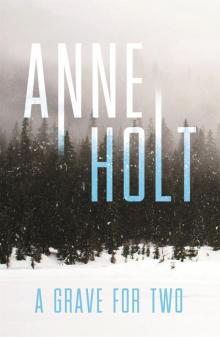 A Grave for Two
A Grave for Two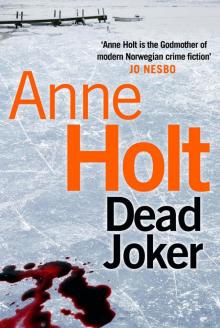 Dead Joker
Dead Joker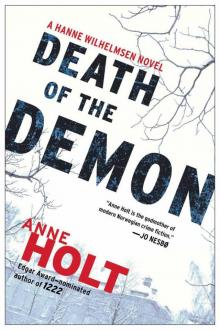 Death of the Demon: A Hanne Wilhelmsen Novel
Death of the Demon: A Hanne Wilhelmsen Novel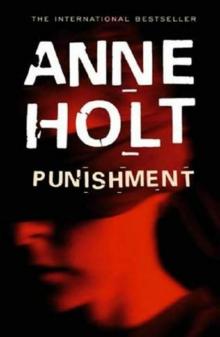 Punishment aka What Is Mine
Punishment aka What Is Mine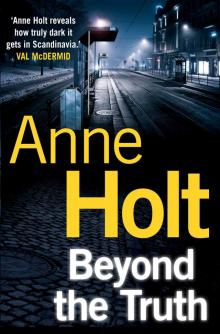 Beyond the Truth
Beyond the Truth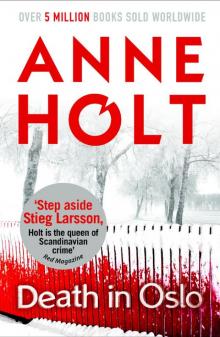 Death in Oslo
Death in Oslo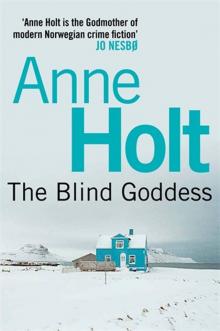 The Blind Goddess
The Blind Goddess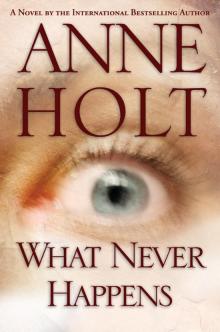 What Never Happens
What Never Happens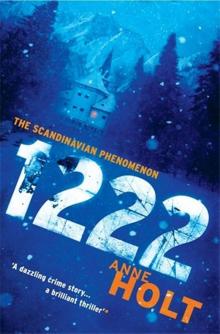 1222
1222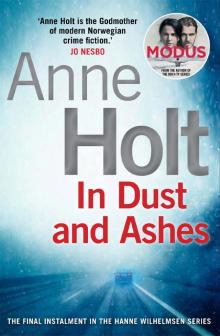 In Dust and Ashes
In Dust and Ashes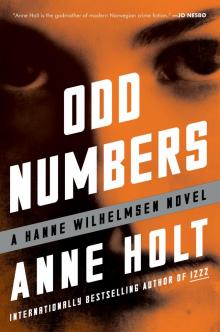 Odd Numbers
Odd Numbers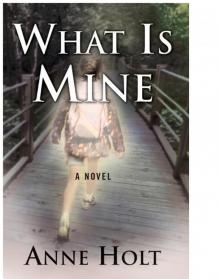 What is Mine
What is Mine What Dark Clouds Hide
What Dark Clouds Hide Blessed Are Those Who Thirst
Blessed Are Those Who Thirst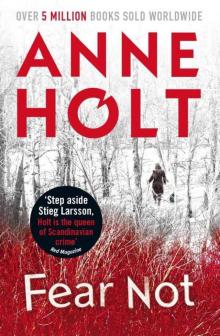 Fear Not
Fear Not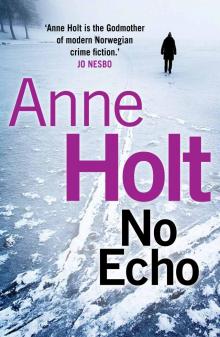 No Echo
No Echo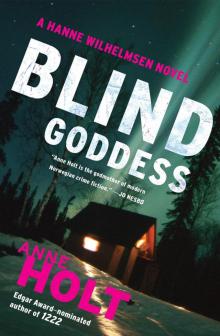 Hanne Wilhelmsen - 01 - The Blind Goddess
Hanne Wilhelmsen - 01 - The Blind Goddess